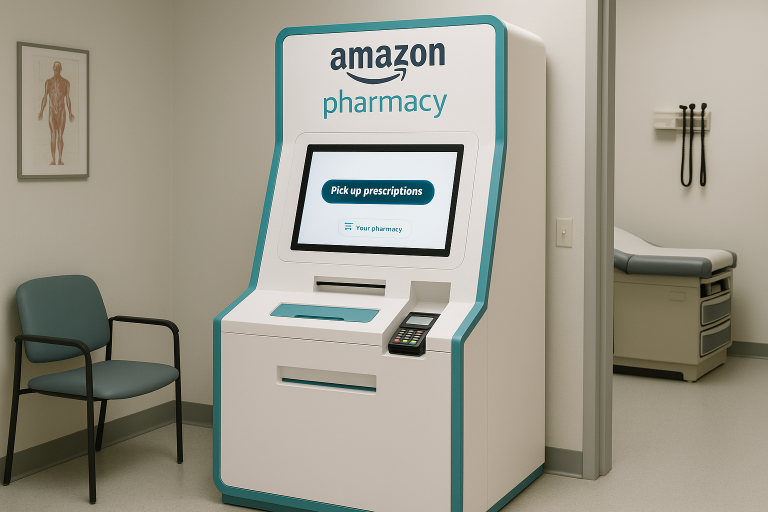In a move that could reshape how Americans collect their medication, Amazon is launching prescription kiosks at select One Medical clinics in Los Angeles.
Starting December 2025, patients visiting these clinics will be able to collect prescribed medicines such as antibiotics, inhalers, and blood pressure drugs within minutes — no pharmacy trip required.
As per a CNBC report, the machines operated by Amazon Pharmacy aim to bridge the gap between doctor visits and treatment by enabling instant, verified dispensing at the point of care.
How the Amazon kiosks work
Each kiosk functions like a high-tech vending machine, stocked with hundreds of commonly prescribed medications.
After a doctor’s visit, the prescription is sent electronically to Amazon Pharmacy, verified remotely by licensed pharmacists, and then processed through the Amazon app.
Patients can confirm the order, pay digitally, and scan a QR code at the kiosk to collect their medicine. The machine then releases the approved medication within minutes.
Patients can also speak directly with a remote pharmacist through video or phone if they have questions before collecting the prescription.
Initially, the kiosks will be located in downtown LA, West LA, Beverly Hills, Long Beach, and West Hollywood.
Amazon says more One Medical offices, and potentially other healthcare locations, will be added over time.
Certain categories, such as refrigerated or controlled substances, will not be available through the machines due to regulatory restrictions.
Amazon’s expanding healthcare ambitions
The move marks Amazon’s latest step into the multitrillion-dollar US healthcare industry.
The company has been steadily integrating medical services under its ecosystem — from its $750 million acquisition of PillPack in 2018 to the $3.9 billion purchase of One Medical in 2022, Amazon’s third-largest deal ever.
Amazon Pharmacy, launched in 2020, already offers same-day prescription delivery in several US cities and a RxPass programme for Prime members that provides access to certain generic medicines at a flat monthly fee.
By adding physical kiosks to One Medical offices, Amazon is tightening the link between diagnosis and medication delivery, while reducing reliance on traditional brick-and-mortar pharmacies.
The kiosks are also expected to cut logistics costs by keeping inventory local, instead of shipping prescriptions across states.
They represent a hybrid model — merging digital convenience, local dispensing, and remote verification — all within the company’s growing healthcare ecosystem.
Challenges over privacy and patient safety
Amazon’s healthcare expansion, however, comes at a time of heightened scrutiny.
Earlier this year, One Medical faced criticism after nine employees accessed a deceased patient’s medical records without a legitimate business reason.
The case sparked a wrongful-death lawsuit, with the plaintiffs alleging that the company failed to meet California’s 15-day reporting rule — a claim Amazon has denied.
Separately, leaked internal documents revealed that some call centre staff without medical training handled sensitive patient queries, prompting concerns over patient safety and privacy.
These incidents underline the potential risks of integrating healthcare with retail-scale operations, particularly as Amazon handles sensitive patient data across multiple platforms.
As the company deepens its role in healthcare, ensuring data security, pharmacist oversight, and medical accountability will be key to sustaining public trust.
The broader impact on US health delivery
The introduction of prescription kiosks could significantly alter how patients fill their prescriptions.
By placing medication access directly within clinics, Amazon hopes to reduce the number of unfilled prescriptions — a common problem when patients need to make separate pharmacy trips after appointments.
If successful, this model could extend to hospitals, corporate clinics, and even universities, offering faster medication fulfilment and lower costs for both patients and providers.
But scaling it nationwide will depend on regulatory approval, operational reliability, and the ability to maintain quality control at every location.
While pharmacy chains like Rite Aid, CVS, and Walgreens continue to close stores amid shrinking margins, Amazon’s model represents a disruptive alternative — combining technology and logistics to redefine the final step in the healthcare process.
The post Amazon launches in-clinic prescription kiosks to simplify access, cut delivery costs appeared first on Invezz

